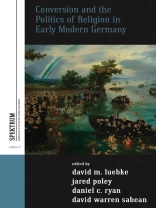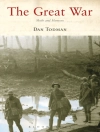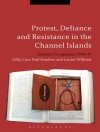The Protestant and Catholic Reformations thrust the nature of conversion into the center of debate and politicking over religion as authorities and subjects imbued religious confession with novel meanings during the early modern era. The volume offers insights into the historicity of the very concept of “conversion.” One widely accepted modern notion of the phenomenon simply expresses denominational change. Yet this concept had no bearing at the outset of the Reformation. Instead, a variety of processes, such as the consolidation of territories along confessional lines, attempts to ensure civic concord, and diplomatic quarrels helped to usher in new ideas about the nature of religious boundaries and, therefore, conversion. However conceptualized, religious change— conversion—had deep social and political implications for early modern German states and societies.
Daftar Isi
Preface
Introduction: The Politics of Conversion in Early Modern Germany
David M. Luebke
Chapter 1. Paths of Salvation and Boundaries of Belief: Spatial Discourse and the Meanings of Conversion in Early Modern Germany
Duane J. Corpis
Chapter 2. Conversion Concepts in Early Modern Germany: Protestant and Catholic
Eric-Oliver Mader
Chapter 3. Turning Dutch? Conversion in Early Modern Wesel
Jesse Spohnholz
Chapter 4. The Right to be Catholic—The Right to be Protestant? Perspectives on Conversion Before and After the Peace of Westphalia
Ralf-Peter Fuchs
Chapter 5. Conversion and Diplomacy in Absolutist Northern Europe
Daniel Riches
Chapter 6. Irenicism and the Challenges of Conversion in the Early Eighteenth Century
Alexander Schunka
Chapter 7. Mish-Mash with the Enemy: Identity, Politics, Power, and the Threat of Forced Conversion in Frederick William I’s Prussia
Benjamin Marschke
Chapter 8. Pietist Conversion Narratives and Confessional Identity
Jonathan Strom
Chapter 9. Conversion and Sarcasm in the Autobiography of Johann Christian Edelmann
Douglas H. Shantz
Afterword
Jared Poley
Bibliography
Notes on the Contributors
Index
Tentang Penulis
David Warren Sabean is the Henry J. Bruman Endowed Professor of German History at University of California, Los Angeles. He is the author of Property, Production, and Family in Neckarhausen, 1700-1870 (Cambridge University Press 1990) and Kinship in Neckarhausen, 1700-1870 (Cambridge University Press 1998). He recently edited, with Simon Teuscher and Jon Mathieu, Kinship in Europe: Approaches to Long-Term Development, 1300-1900 (Berghahn Books 2007).












